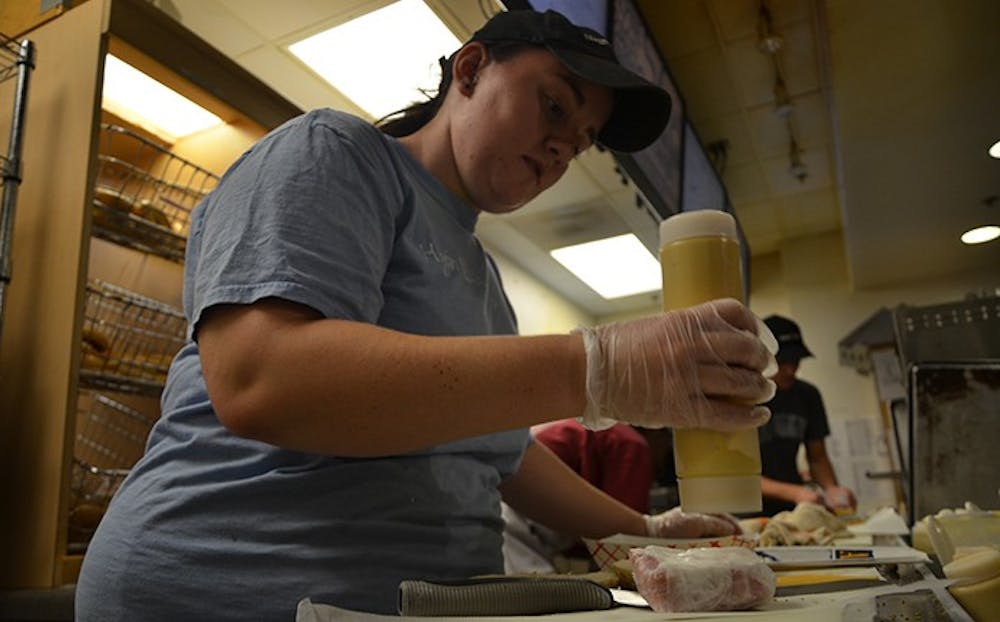“It would be impossible unless you had a very, very high wage job — which you’re not going to have if you’re a student going to school full-time.”
In the previous academic year, UNC distributed about $400 million in aid for undergraduate and graduate students — the federal government providing the largest share of that money.
While the majority is given out as either grants or scholarships, a little more than a quarter of funds was loaned to students. Ort said the number of students who qualify based on need has leveled out in the wake of the Great Recession.
“We hit a high point in 2009, and then it was as though the economy has caught up with everybody,” Ort said.
Michelle Klemens, assistant director for employment programs at UNC, said the University employs about 2,000 students every year through the federal work-study program, a need-based program that matches students to jobs in departments across campus. Students also can also find employment outside work-study at various departments across campus.
UNC does not have data for how many students are employed outside the University, but according to the U.S. Bureau of Labor Statistics, 38 percent of students who enrolled in fall 2012 were either employed or actively seeking employment.
Klemens said funding for work-study saw a decrease after it stopped receiving money from the American Recovery and Reinvestment Act two years ago, but the funds have stayed relatively stable since.
“There really hasn’t been huge changes in the program in terms of total budget but more and more students are interested,” she said.
There is a cap to the money that students can earn while doing work-study. Once that limit is met, the work-study ends and the department has the option of hiring the student on their own payroll.
Klemens said the program benefits the students, but does not come close to covering the costs of attending UNC.
Klemens has been overseeing the program for the past five years and said while the funds have remained relatively stable, student interest has only increased.
She said students typically benefit from the experience because the office tries to match students to jobs that would mirror their ultimate career goals.
To get the day's news and headlines in your inbox each morning, sign up for our email newsletters.
“Anything that the student might want to do, we can probably get them into somehting,” she said. “It’s a good way to meet those expenses that pop up during the year. It helps them adjust to student life — also a great way to get valid work experience and network.”
Junior Alex Drose works two jobs, one for ResNET and one for Lime Fresh Mexican Grill on Franklin Street.
Her majors are Italian and linguistics, and she said she is considering a teaching career after graduation. But she said she’s not certain how that will help with the loans she had to take out to cover tuition.
“Heck, if I’m teaching I’m not going to be making enough to pay them off with interest,” she said.
Drose said the money she makes goes towards rent, living expenses and trying to get a head start on the debt that is looming when she graduates. She received an email Saturday saying she had paid off one of her loans and now she can work on the four other private loans she used to pay for the past two years.
“I’m just trying to be proactive and pay off now because I don’t have the slightest idea what I’m going to do when I graduate.”
Desiree Rieckenberg, senior associate dean of students, has direct contact with students when they come to her office see relief from financial burdens. She said each student that comes in has a unique set of stresses, and they must be evaluated case by case.
“Money is for most of our students, or at least some of our students, it’s one of those things that is a necessity for them to manage their day to day.” she said.
Rieckenberg said her office offers many resources for students who find themselves strapped for cash, including the emergency student fund which covers expenses incurred in critical situations.
Rieckenberg said her main concern with financial worries is that it would affect a student’s coursework and ultimately his or her graduation.
Gaylord-Miles did not run in to that problem, despite working several jobs throughout her academic career and taking on internships to ensure a future career in urban planning.
But she says after four years, she’s looking forward to graduation and losing the burden of being both a student and an employee.
“There’s a point where you don’t want to be working 40 hours a week while in school,” she said.
“Life’s going to be a lot easier when you graduate and only have to go to work.”
university@dailytarheel.com



